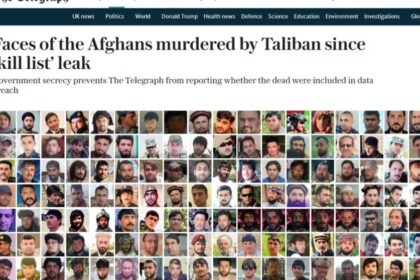RASC News Agency: Out of the suffocating silence of Taliban-run prisons in Kabul, a letter surfaced weak in voice yet unbroken in will addressed to Marshal Abdul Rashid Dostum, leader of the National Islamic Movement of Afghanistan. It was not merely a plea for one woman’s freedom; it was an indictment of an entire regime and a summons on behalf of millions of Afghanistani women erased, brutalized, and condemned to oblivion under a system of codified gender persecution. Dostum, confirming that he had read the letter “with a heart full of pain,” replied with a promise that the present order “will not endure,” assuring that the day will come when the balance of power shifts and the voices of women will no longer be silenced by fear.
The imprisoned woman’s words strip away every pretense: “If you remain silent today, tomorrow even the soil of our graves will be taken from us.” She describes a carceral geography of terror prisons echoing with the screams of girls whose only crimes are to breathe freely, to study, to protest, to exist. Women are flogged and tortured, condemned to solitary confinement, erased by design. Their suffering is not incidental; it is policy. Her testimony arrives as human-rights organizations repeatedly warn of the appalling conditions inside Taliban detention centers. Hundreds of women activists, students, journalists, and civil resisters have been arrested simply for defending fundamental rights. Credible reports have documented physical torture, sexual assault, psychological degradation, incommunicado detention, and sham “trials” devoid of legal counsel or due process from Kabul to Kandahar to Herat. What the Taliban advertise as “justice” is, in reality, a machinery of domination, administered through fear, cloaked in piety, and enforced with impunity.
This letter is therefore not a private lament; it is a manifesto of resistance. It confronts a world that too often negotiates with the Taliban on “technical files” and “security coordination,” while women are denied education, employment, movement, identity, law, and dignity. It confronts political actors who seek “stability” at the price of silence. And it confronts Afghanistani leaders in exile: those who claim to oppose tyranny are now being asked to do more than issue statements they are being called to action by those who carry the cost of their inaction on their bodies. Dostum’s response, brief yet defiant, lands as a rare political acknowledgment of women’s suffering and endurance under Taliban rule. But the weight of the moment demands more than sympathy; it demands structure, leverage, and strategy. Promises alone cannot breach the walls of secret cells. To translate this cry into consequence, several imperatives are unavoidable:
Document, preserve, prosecute: Build secure, survivor-centered channels (inside and outside the country) to document torture, sexual violence, and unlawful detention for future legal action under international human-rights and humanitarian law. Condition every form of engagement: Any diplomatic contact, economic facilitation, or platform granted to the Taliban must be tied to verifiable, enforceable benchmarks the reopening of girls’ schools and universities; restoration of women’s right to work and move freely; the publication of detainee lists; access for independent monitors to prisons; and the immediate end of public corporal punishment and secret trials.
International protection pathways: Establish emergency evacuation corridors and resettlement programs for high-risk women journalists, activists, former officials, and human-rights defenders now effectively trapped in a carceral state. Islamic jurisprudential clarity: Prominent Muslim jurists and councils must state, again and again, that the Taliban’s gender apartheid and carceral brutality violate the spirit and letter of Islamic ethics and law, denying the regime the religious veneer it exploits to sanctify repression. Targeted accountability: Impose sanctions, travel bans, and asset freezes on Taliban security, judicial, and intelligence officials directly implicated in the persecution, torture, and disappearance of women and civil activists.
The woman’s letter is a mirror held up to a collapsed moral order: a regime that rules through terror because it cannot govern through consent, and an international architecture too often hesitant to wield its leverage where it matters most on human dignity, not diplomatic cosmetics. It is also a mirror to Afghanistani political factions, many of whom claim to champion democracy, yet have failed to articulate a coherent, inclusive, rights-centered alternative that places women not as symbols, but as full political actors at the core of any future settlement. “This will not last,” Dostum vowed. History will test whether those words become more than consolation whether they evolve into an organized strategy to dismantle the system that produced the cell, the lash, the silence. For now, the letter remains both warning and witness: if the world remains silent today, tomorrow even the memory of the disappeared will be confiscated.






